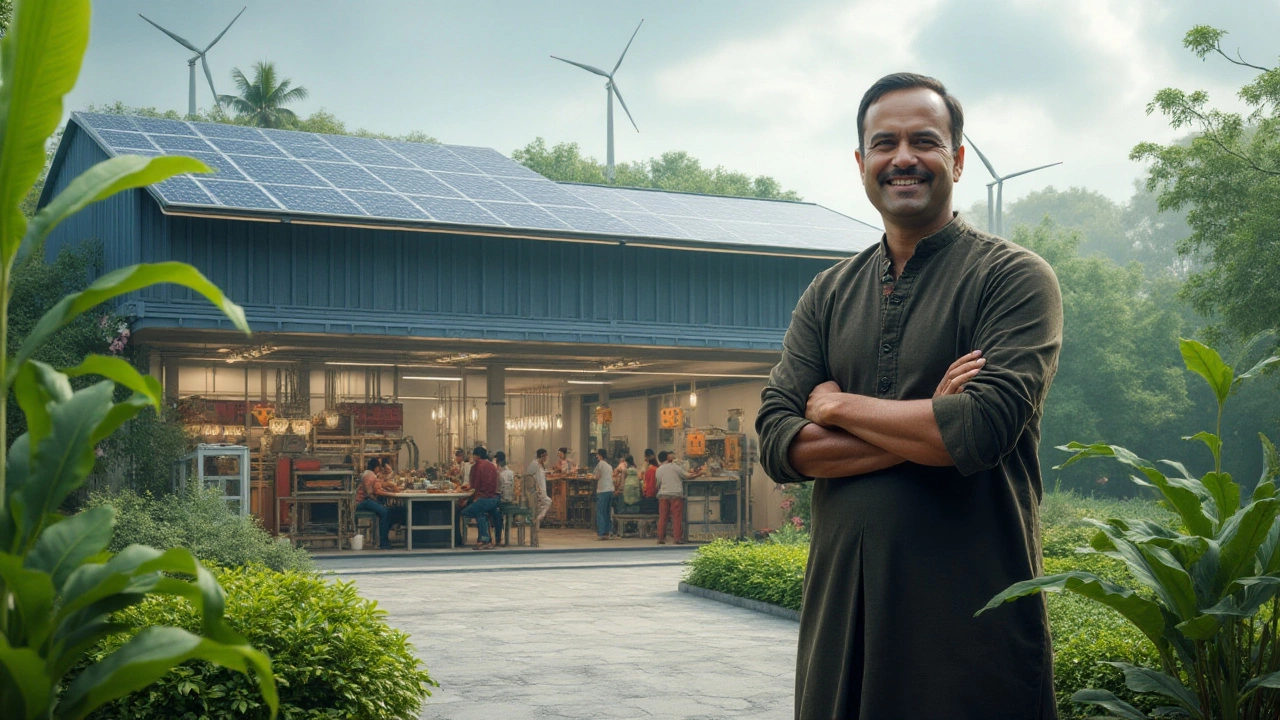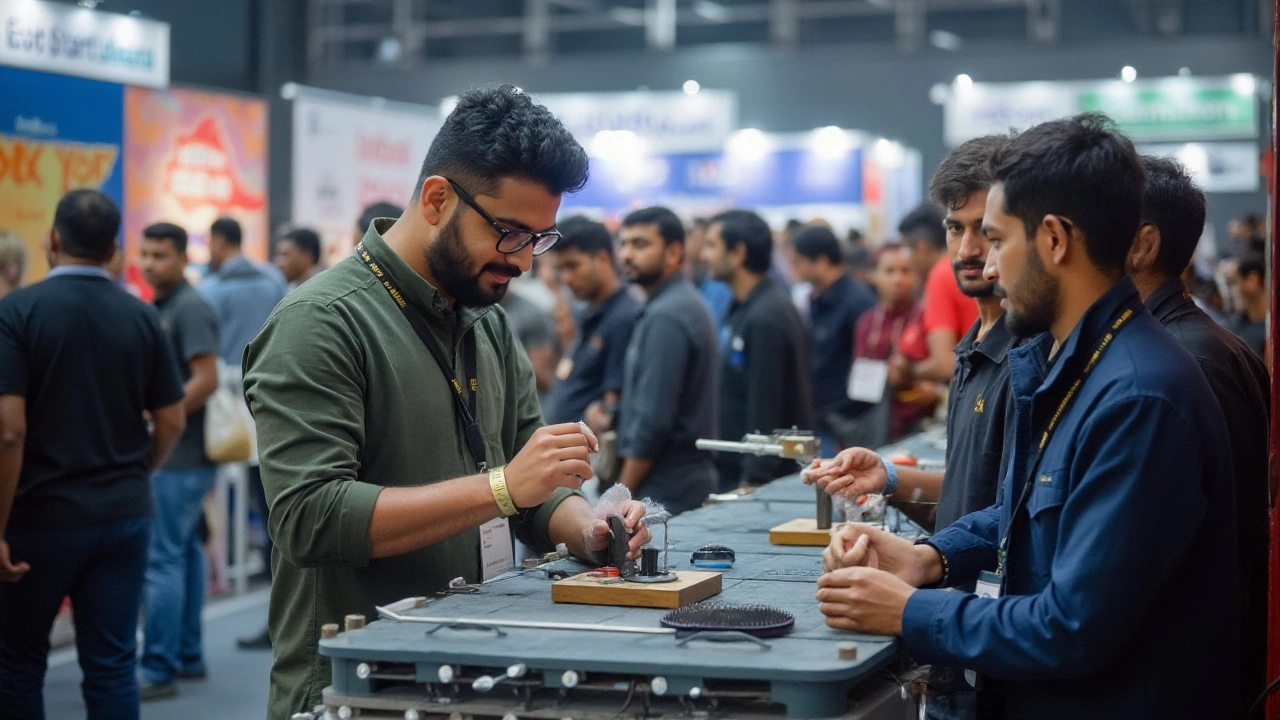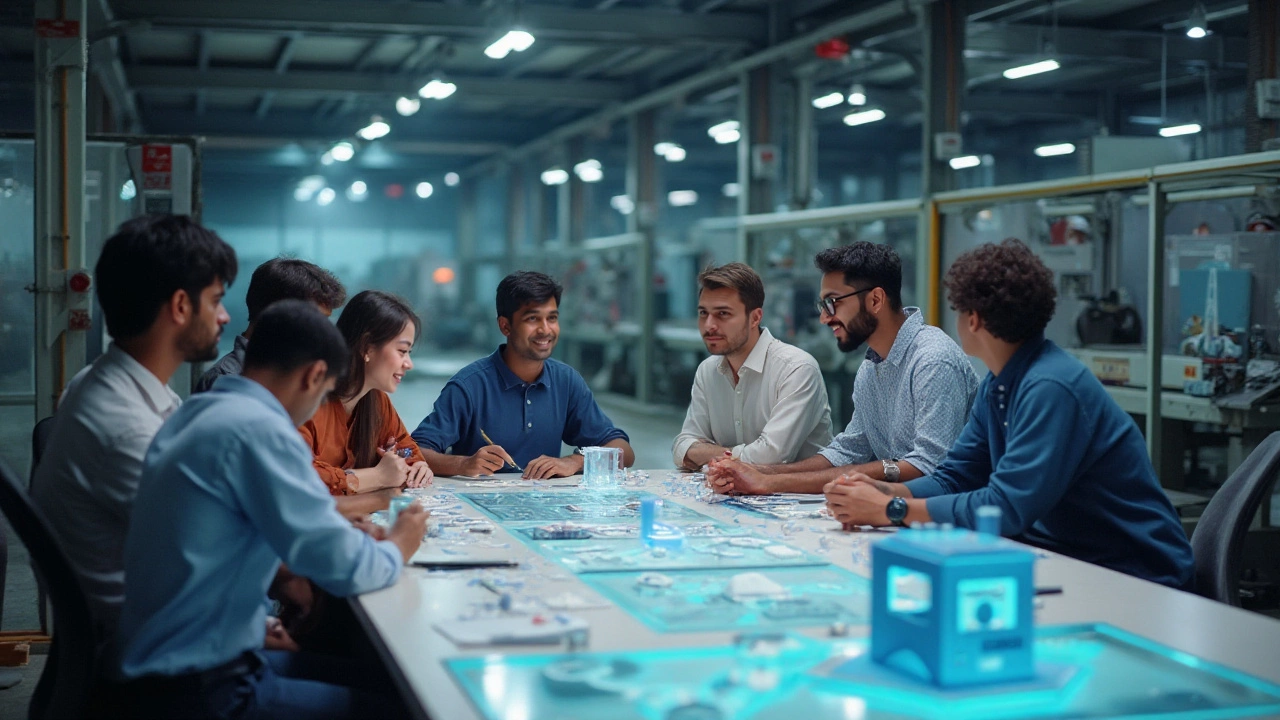As we stand on the brink of 2025, the manufacturing industry is not merely getting by; it's booming. Startups are leading a charge that sees a blend of technology, sustainability, and personalization like never before. The landscape has become fertile ground for innovators ready to make their mark. What's driving this momentum? And what ideas are proving to be the gold mines of the present day?
In this article, we'll dive into the heart of what's working in manufacturing right now, uncovering the secret sauce of today's thriving startups. From leveraging cutting-edge technologies to embracing green manufacturing practices, the opportunities are ripe for those ready to leap. Whether you're a seasoned entrepreneur or someone looking at their first venture, understanding these trends could be your key to success.
- Emerging Technologies in Manufacturing
- Sustainable Manufacturing Practices
- Custom and Personalized Production
- Tips for Starting a Manufacturing Business
Emerging Technologies in Manufacturing
The manufacturing landscape in 2024 is vastly different from what we saw just a few years ago, largely due to the rise of new technologies that are reshaping the way industries operate. These emerging technologies are not just meeting the current demands but are also setting the stage for unprecedented growth and efficiency. One of the most transformative advancements is in the field of additive manufacturing, commonly known as 3D printing. This technology has evolved to allow the production of complex and customizable parts at a fraction of traditional costs. The ability to rapidly prototype and produce on-demand reduces material waste significantly and shortens time-to-market, offering a competitive advantage to startups embracing this technology.
Another groundbreaking innovation is the use of artificial intelligence (AI) and machine learning (ML) in manufacturing processes. AI has moved beyond the experimental phase and is now integral to many operations, improving accuracy and efficiency. Predictive maintenance, quality control, and supply chain optimization are just a few areas where AI is driving value, anticipating failures before they occur, thus saving costs and minimizing downtime.
According to McKinsey, AI in manufacturing can boost productivity by up to 20%, marking it as a key driver of industry success.This growing integration highlights the importance for startups to consider incorporating AI-driven solutions into their operations.
The Internet of Things (IoT) is also playing a significant role in transforming the industry. IoT devices collect and analyze data in real-time, facilitating smarter and faster decision-making. This connectivity allows for a more streamlined process that increases efficiency while reducing waste. From inventory tracking to waste management, the applications of IoT are vast and can be especially beneficial for smart manufacturing ecosystems. A connected factory floor maximizes output while providing crucial insights into performance, enabling startups to optimize resources and reduce operational costs.
Moreover, advancements in robotics offer remarkable opportunities in terms of precision and efficiency. Modern robots are not only more affordable but also easier to program, allowing for greater flexibility in small-batch production. Cobots, or collaborative robots, are designed to work alongside human workers, with safety features that make them a more viable option for various industries. This technology democratizes automation, making it accessible not only to large corporations but also to manufacturing startups looking to scale up their operations efficiently.
With these innovations, embracing augmented reality (AR) and virtual reality (VR) can further enhance training, design, and maintenance processes. These technologies are bridging the gap between digital and physical worlds, providing immersive experiences that contribute to more effective workforce training and streamlined design processes. As the manufacturing sector continues to evolve, startups have an edge by incorporating these cutting-edge technologies early. This integration helps them navigate challenges and seize opportunities in the ever-changing market dynamics, ensuring that they remain competitive and thrive.

Sustainable Manufacturing Practices
In recent years, sustainable manufacturing has transcended from being a mere buzzword to a critical pillar of industrial operations. Today, more than ever, companies are committed to reducing their carbon footprints and embracing eco-friendly processes. The driving force behind this shift is twofold: regulatory pressure and growing consumer demand for green products. Manufacturers worldwide are recalibrating their operations to prioritize energy efficiency, waste reduction, and resource conservation. These efforts are not just about compliance but also about seizing opportunities in the emerging green economy. There's an array of government incentives and subsidies for companies choosing to adopt sustainable practices, which can significantly offset initial transition costs and enhance competitiveness in various markets.
Transitioning to sustainable manufacturing often involves integrating renewable energy sources, such as solar and wind, into daily operations. This integration not only reduces dependency on fossil fuels but also substantially lowers operational costs in the long run. Advanced technologies, including IoT and AI, play a crucial role in monitoring and optimizing energy consumption, ultimately enhancing production efficiency. Additionally, a focus on sustainable manufacturing paves the way for startups to innovate. They can introduce eco-friendly materials or design products that are easier to recycle. For example, biodegradable plastics and materials derived from natural sources are gaining traction due to their minimal environmental impact compared to conventional materials.
Another important aspect of sustainable practices is the circular economy, a model that emphasizes designing products with life cycle considerations. This concept encourages manufacturers to create products that are not only durable and of high quality but also reusable, repairable, and recyclable. By embracing a circular approach, manufacturers can reduce waste significantly, transforming traditional linear processes into closed-loop systems. This not only results in environmental benefits but also creates new revenue streams through recycling and repurposing initiatives. A well-known example is the automotive industry. Many forward-thinking companies now focus on remanufacturing components and parts, leading to considerable savings and efficiency gains.
"Sustainability is not just an act of good corporate stewardship. It’s critical to creating lasting financial value for our shareholders," says Andrew Liveris, former CEO of Dow Chemical Company, highlighting the growing recognition that sustainable practices offer both environmental and economic advantages.
Looking at current trends and future potential, the prospect for startups in the field of sustainable manufacturing is brighter than ever. As they explore sustainable materials and technologies, new businesses can carve out niches by offering specialized solutions that meet ever-evolving regulatory and consumer demands. Business models that embrace sustainability are not just about reducing harm but actively contributing to societal well-being. Whether it is establishing local supply chains to reduce transport emissions or innovating new recycling methods that extend the life cycle of products, the opportunities are immense and impactful.

Custom and Personalized Production
The rise of custom and personalized production in manufacturing has been nothing short of revolutionary. As consumers increasingly desire products that reflect their individual tastes and preferences, companies are swiftly adapting by offering bespoke options. This shift isn't just a trend; it's becoming an expectation in various markets, from fashion to electronics. For centuries, production lines emphasized standardization, but now the focus has shifted intensely towards differentiation and customization.
One of the most significant drivers behind this trend is the rapid advancement in technology, particularly 3D printing and CNC machining. These technologies have enabled manufacturers to create tailored goods on demand, without significant cost penalties. 3D printing, in particular, has opened avenues for prototypes and small batch production that were prohibitively expensive using traditional methods. A 2023 report by McKinsey noted that the adoption of such technologies could reduce material waste by up to 60%, showing both economic and environmental benefits.
"In today's market, the ability to offer customized products at scale is becoming as critical as price and quality—something that was unthinkable a decade ago," says Dr. Mark Fleming, an analyst specializing in industrial innovation.
The versatility and speed at which manufacturing startups can bring personalized items to market cater to modern consumer appetites for uniqueness. Consider the success of sneaker companies offering custom designs – each shoe reflecting a user's personality or style preference. It's not just about the uniqueness; it's about the emotional connection that personalized goods can forge between brands and customers. This connection often translates into customer loyalty and brand advocacy.
Moreover, data analytics plays a pivotal role in understanding and predicting consumer demands, further fueling personalized production. Companies leverage big data to analyze trends and customer behaviors, allowing them to anticipate what consumers will want next. This foresight diminishes risks associated with stocking unsold inventory and permits manufacturers to keep pace with fast-changing market demands. A 2024 survey found that 71% of consumers are willing to pay a premium for products made specifically for them, highlighting the value perceived in tailored goods.
Challenges and Opportunities
Despite the myriad opportunities, there are challenges to personalized production that startups must overcome. Scaling production to meet bespoke orders efficiently remains a complex issue. Inventory management becomes trickier when dealing with numerous custom components, parts, and designs. The capacity to maintain high-quality standards in personalized batches needs meticulous attention and robust quality control systems. However, for those navigating these challenges successfully, the rewards are lucrative. As e-commerce platforms refine their logistics capabilities, even small startups can deliver custom orders globally, using this disruption to penetrate foreign markets.
For aspiring entrepreneurs looking to enter this thriving sector, it's crucial to realize that bespoke manufacturing doesn't just start and end with technology. Building a strong brand story and engaging with the customer personally can significantly push your venture ahead. Naming platforms and social media play an essential role in crafting and sharing these stories effectively. Therefore, manufacturers must fuse creativity with analytics to provide not only products but experiences that resonate on a personal level with their audience.

Tips for Starting a Manufacturing Business
Starting a manufacturing business can seem daunting, but with the right strategies and understanding, it can be an incredibly rewarding endeavor. Firstly, it's crucial to conduct thorough market research. You need to know your potential competition, understand the demand for the products you plan to manufacture, and identify your target audience’s needs. This step is essential in crafting a sound business model and helps in positioning your manufacturing startups effectively in the market. A detailed competitive analysis can reveal gaps in the market that your business could fill, setting the groundwork for success.
Once the research phase is complete, developing a solid business plan is the next logical step. This plan should cover everything from initial costs, projected financials, to growth strategies and operational plans. Having a clear, detailed roadmap helps not only in guiding your business direction but also in attracting potential investors. Investors are often keen on seeing a comprehensive plan before parting with their funds, which effectively means your business plan could either make or break essential funding opportunities. Also, consider legal obligations, such as licenses, permits, and understanding and complying with industry regulations.
"Success in manufacturing comes down to a well-laid-out strategy that aligns with the current industry trends," says Marty Abbott, a renowned manufacturing strategist.
When it comes to setting up operations, location plays a significant role. It's not just about the geographic location; you're also deciding on whether to rent or buy your manufacturing space, and the decision impacts your initial costs and future scalability. Similarly, technology integration is another critical aspect. With advancements in IoT and AI, even humble manufacturing startups can benefit from smart technologies. These can streamline processes, improve efficiency, and reduce waste, which ultimately results in cost savings. Consider starting lean and scaling your technological integration as your business grows.
On the human resources front, building a skilled workforce that is adaptable to various roles and willing to engage with technology is vital. Many of the thriving sectors often see a rapid pace of change, and having a workforce that can handle transitions smoothly is a competitive advantage. Investing in regular training and development programs keeps your team motivated and up-to-date with the latest manufacturing practices.
Develop a Strong Supply Chain
A strong, reliable supply chain can make a significant difference. Working with suppliers who align with your business values, especially when it comes to sustainability and quality, can ensure smoother operations. Regularly revisiting your supply chain strategy is a practice that will keep your business resilient and flexible, adapting to market changes effectively. Manufacturing startups that succeed often have networks capable of withstanding sudden disruptions, whether due to global events or market shifts.
Utilize Marketing and Brand Management
Finally, do not underestimate the power of effective marketing and brand management. In today's digital age, engaging with your audience through multiple channels is imperative. Having a robust online presence, utilizing social media, and maintaining a user-friendly and informative website can set you apart from competitors. Sustainable manufacturing practices can also be a powerful marketing tool, as consumers increasingly lean towards environmentally conscious choices. Effective storytelling about your sustainable practices can enhance your brand's value and increase customer loyalty.
Embarking on a manufacturing business journey is more than just about setting up machines and processes; it's about creating a well-rounded, adaptable, and resilient venture. By focusing on these comprehensive tips and keeping an eye on industry trends, your business could not only thrive in 2024 but set a precedent for the future.
